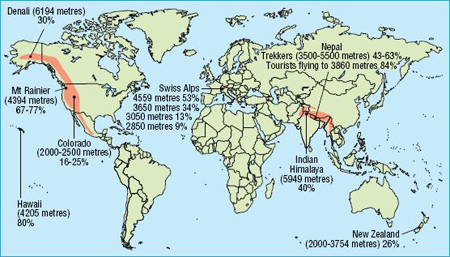Resumo
Definição
História e exame físico
Principais fatores diagnósticos
- headache
- ataxia
- change in mental state: for example, tired, irritable, confused, forgetful, irrational
- abnormal tone, power, and reflexes
Outros fatores diagnósticos
- nausea, vomiting, and loss of appetite
- fatigue and weakness
- dizziness or lightheadedness
- difficulty sleeping
- visual disturbance
- shortness of breath
- cough with or without sputum
- rales
- peripheral edema
- accentuated pulmonary second sound
- pyrexia
- elevated respiratory rate
- elevated heart rate
- low arterial oxygen saturation
- cyanosis
- urinary incontinence or retention
- retinal hemorrhages and papilledema on fundoscopy
- chest pain
- cranial nerve palsies (III, IV, and VI)
- visual and auditory hallucinations, seizures, tinnitus, vertigo, tremors, speech disturbance, and deafness
Fatores de risco
- high altitude
- rapid ascent
- low-altitude residence
- history of previous altitude illness
- younger age
- exertion
- poor awareness of high-altitude illness prior to travel
- existing medical condition
Investigações diagnósticas
Primeiras investigações a serem solicitadas
- clinical diagnosis
Investigações a serem consideradas
- arterial blood gases
- chest radiography
- ECG
- chest ultrasound and echocardiography
- WBC count
- lumbar puncture
- CT head
- MRI head
Algoritmo de tratamento
high-altitude ascent planned
AMS
HAPE only
HACE only
concurrent HAPE and HACE
Colaboradores
Autores
Jeremy S. Windsor, MBChB, DCH, FCARCSI
Consultant
Anaesthetics and Critical Care
Chesterfield Royal Hospital
Derbyshire
UK
Director
Centre for Mountain Medicine
University of Lancashire
UK
Declarações
JSW is an author of a number of references cited in this topic.
Revisores
James S. Milledge, MBBS
Honorary Professor
Department of Physiology
University College London
London
UK
Declarações
JSM declares that he has no competing interests.
Mike Grocott, MD
Senior Lecturer
Intensive Care Medicine
University College Hospital
London
UK
Declarações
MG declares that he has no competing interests.
Haibo Wang, MD, PhD
Assistant Professor
LSU Health Sciences Center
Shreveport
LA
Declarações
HW declares that he has no competing interests.
Créditos aos pareceristas
Os tópicos do BMJ Best Practice são constantemente atualizados, seguindo os desenvolvimentos das evidências e das diretrizes. Os pareceristas aqui listados revisaram o conteúdo pelo menos uma vez durante a história do tópico.
Declarações
As afiliações e declarações dos pareceristas referem--se ao momento da revisão.
Referências
Principais artigos
Centers for Disease Control and Prevention. CDC Yellow Book 2026: health information for international travel. Section 3: environmental hazards & risks - high altitude travel and altitude illness. Apr 2025 [internet publication].Texto completo
Roach RC, Hackett PH, Oelz O, et al. The 2018 lake louise acute mountain sickness score. High Alt Med Biol. 2018 Mar;19(1):4-6.Texto completo Resumo
Luks AM, Beidleman BA, Freer L, et al. Wilderness Medical Society clinical practice guidelines for the prevention, diagnosis, and treatment of acute altitude illness: 2024 update. Wilderness Environ Med. 2024 Mar;35(suppl 1):2S-19S.Texto completo Resumo
Donegani E, Paal P, Küpper T, et al. Drug use and misuse in the mountains: a UIAA MedCom consensus guide for medical professionals. High Alt Med Biol. 2016 Sep;17(3):157-84. Resumo
Ritchie ND, Baggott AV, Andrew Todd WT. Acetazolamide for the prevention of acute mountain sickness - a systematic review and meta-analysis. J Travel Med. 2012 Sep-Oct;19(5):298-307.Texto completo Resumo
Artigos de referência
Uma lista completa das fontes referenciadas neste tópico está disponível para os usuários com acesso total ao BMJ Best Practice.

Diagnósticos diferenciais
- Asthma, acute exacerbation
- Community-acquired pneumonia
- Acute exacerbation of chronic heart failure (CHF)
Mais Diagnósticos diferenciaisDiretrizes
- CDC Yellow Book: health information for international travel - high-altitude travel and altitude illness
- Wilderness Medical Society practice guidelines for the prevention, diagnosis, and treatment of acute altitude illness: 2024 update
Mais DiretrizesConectar-se ou assinar para acessar todo o BMJ Best Practice
O uso deste conteúdo está sujeito ao nosso aviso legal